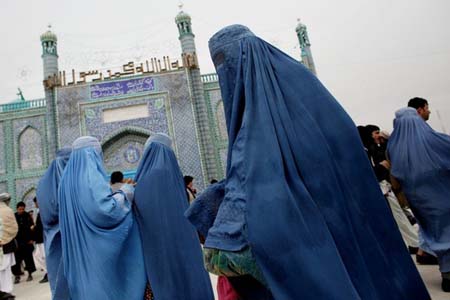By Lynne O'Donnell
MAZAR-I-SHARIF, Afghanistan — Women living in Afghanistan's safest region are retreating behind the veil amid fears they are being stalked by a resurgent Taliban determined to trample their rights.

"The atmosphere is changing, women on the streets of Mazar are covering their faces, they are retreating behind their burqas because they fear the Taliban are getting closer," said Hamid Safwat, manager of an independent shelter for distressed women. Photo: Islamization Watch
Human rights groups are concerned that plans by the Afghan government to make peace with the Taliban could lead to an erosion of women's liberties.
On Tuesday, about 80 international representatives, including US Secretary of State Hillary Clinton, gathered in Kabul to endorse President Hamid Karzai's programme of reconciliation and reintegration with the Taliban leadership.
But as attacks escalate across the previously peaceful north, and the insurgency's footprint expands, women are losing confidence that their hard-won rights are inviolable.
Clinton used part of her speech to defend Afghan women. "If they are silenced and pushed to the margins of Afghan society, the prospects for peace and justice will be subverted," she warned.
In Mazar-I-Sharif, the largest city on Afghanistan's northern plain, fewer women are venturing out in public with bared faces, and the burqa is making a comeback, not as a fashion accessory but as protection, many said.
"The atmosphere is changing, women on the streets of Mazar are covering their faces, they are retreating behind their burqas because they fear the Taliban are getting closer," said Hamid Safwat, manager of an independent shelter for distressed women.
"Women are living in great fear of a peace deal with the Taliban because of what it will mean for their rights," he told AFP.
"If they are not already here physically, their presence, their proximity is being felt.
"If the Taliban comes to the peace process and gets into parliament, they will join up with the fundamentalists to form a bloc and they will erode what rights Afghan women have fought for since 2001," he said.
Women at the shelter, one of only a handful in the country, said they worried that an already tough existence could become worse.
Gul Andaman spent a year in prison for refusing to marry a man selected by her brothers, and came to the shelter after her release because they threatened to kill her, she said.
Now, after three years at the safe house, she said her brothers were still insisting she return to the family home and marry the man of their choice.
"What can a woman do?" she said.
"Life for Afghan women is just so bad but if President Karzai does talk to the Taliban, and they become more powerful, then of course things will get even worse."
Karzai's plan for making peace with the Taliban has won broad support from the international community as the war becomes increasingly unpopular with the Western public, and leaders struggle to develop an exit strategy.
Reintegration focuses on the so-called "10-dollar Talibs", poor men who, lacking employment alternatives, fight for the insurgency.
The broader concept of reconciliation involves talks with the Taliban leadership, based in Pakistan, on power sharing, third-country exile and removal from a UN list of terror suspects.
Rights activists fear the Islamists will demand reversals of liberties guaranteed for women in the Afghan constitution, and New York-based Human Rights Watch (HRW) suggests an accommodation has already begun.
British and NATO commanders and diplomats have said talks with the Taliban are the best path to peace after nine years of insurgency, and the United States appears to have softened earlier opposition.
HRW said women in Taliban-controlled areas experience similar conditions to those imposed during the Islamists' 1996-2001 regime, when girls were not allowed to go to school or women leave home without a male relative or wearing a burqa.
Even now schoolgirls suffer attacks and their schools are destroyed by extremists. Women who become politically active often face death threats and some have been murdered or forced into exile.
The Taliban hold sway over large parts of the south, with a presence across most of Afghanistan.
A rising number of attacks in the north -- including the beheading of six policemen in Baghlan province on Tuesday -- shows the insurgency is spreading beyond its traditional southern heartland.
Until recently, women in Mazar-I-Sharif said they believed they lived in the safest and most liberal part of the country.
Not any more, said Safwat.
"Even the vague possibility that the Taliban are coming makes women afraid, makes everyone afraid because here in the north they have a lot to lose."



